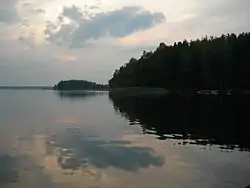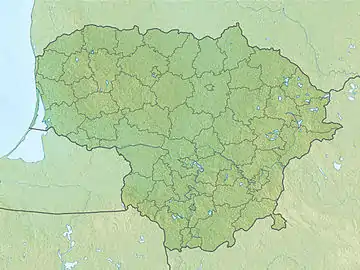Baltieji Lakajai
Baltieji Lakajai ( meaning White Lakajai ) is a major lake of eastern Lithuania, located about 12 miles east of Moletai, in Labanoras Regional Park of Utena County.[1] It is part of the Neris River basin,[2] an elongated lake in a west–east direction. The lake is of glacial original as are all 9,000 and odd natural lakes (at the last official count and over 4,000 larger than half a hectare) covering 1.5% of the land area of Lithuania.[3]
| Baltieji Lakajai | |
|---|---|
 | |
 Baltieji Lakajai | |
 | |
| Coordinates | 55°12′57″N 25°36′29″E |
| Basin countries | Lithuania |
| Max. length | 8.6 km (5.3 mi) |
| Max. width | 1.3 km (0.81 mi) |
| Surface area | 6.998 km2 (2.702 sq mi) |
| Max. depth | 45 m (148 ft) |
| Shore length1 | 24.5 km (15.2 mi) |
| Islands | 3 |
| 1 Shore length is not a well-defined measure. | |
The Baltieji Lakajai is part of Labanoras Regional Park that was established in 1992.[4]
Description
Its total area is 6.998 km², its length is 8.6 km and its maximum width is 1.3 km.[5] The lake has three islands which cover an area of 3.8 hectares. Along the waterhole is a 40–50 m deep ravine.[6] The coastline of the lake has a total length of 24.5 km, and has many coves, bays and peninsulas.[6] It is a relatively shallow lake with a maximum depth of 45 metres, narrow, and almost no beaches.[6] Pine forests line the shores in most parts.[6] The smaller Tramys lakes are just to the northeast, to the west is Lake Siesartis, and to the south (from west to east) is Lake Urkis, Lake Kertuojai and Juodieji Lakajai.[7] The lake can be accessed by foot via Highway 114 from the north and Highway 173 from the southwest and is quite popular with vacationers.[6]
Fish fauna

The vendace (Coregonus albula) and the smelt (Osmerus eperlanus) are the two species (Vendace is an individual of Coregoninae and smelt of Osmeridae) of cold water fish, which belong to Salmoniformes that are found in abundance in the Baltieji Lakajai, apart from in 74 other large and deep water lakes in Lithuania.[8]
Recreation
Villages around the lake include Rudesa, Kamužė, Grūsis, Ažuraisčiai, Antalakaja, Apkartai, Ščiurys, Palakajys, and Mateliai. The lake has population of perch, roach, pike and bream and there are also eels and crayfish.[9] A permit for angling on the lake is required from the Lithuanian Environmental Protection Agency. The lake is also popular with divers. Water tourism and recreational infrastructure have been created in the lake area.[10]
References
- Zinkevičius, Zigmas; Luchtanas, Aleksiejus; Česnys, Gintautas (2005). Where we come from: the origin of the Lithuanian people. Science & Encyclopedia Publishing Institute. p. 94. ISBN 978-5-420-01572-8. Retrieved 18 April 2011.
- Zakład Biologii Wód (Polska Akademia Nauk); Zakład Biologii Wód im. Karola Starmacha (1989). Acta hydrobiologica. Karol Starmach of Freshwater Biology. p. 330. Retrieved 18 April 2011.
- "Land of a Thousand Lakes". Magazine Lithuania: Vol. 15, No 4. 2007. Archived from the original on 20 July 2011. Retrieved 19 April 2011.
- "Labanoras Regional Park". Museum of Learning. Retrieved 19 April 2011.
- "INTERREG IIIA projektas "Naujo turistinio regiono kūrimas vienijant du pasienio regionus - Latgalą ir Rytų Aukštaitiją", iš dalies finansuojamas iš ES lėšų". Baltic Country of Lakes, European Union. Archived from the original on 19 July 2011. Retrieved 18 April 2011.
- "Baltieji Lakajai, ežeras Molėtų rajone". zvejosvetaine.lt. Retrieved 18 April 2011.
- Baltieji Lakajai. Tarybų Lietuvos enciklopedija, T. 1 (A-Grūdas). Vilnius, Vyriausioji enciklopedijų redakcija, 1985, 185 psl
- "Influence of Physical Water Parameters on The Growth and Abundance of Vendace and Smelt Under Natural and Thermogradient Conditions" (PDF). Acta Zoologica Lituanica. Volumen 10. Numerus 4. 2000. ISSN 1392-1657. Archived from the original (pdf) on 2011-07-20. Retrieved 19 April 2011.
- "Baltieji Lakajai". Molėtų turizmo ir verslo informacijos centre. Retrieved 18 April 2011.
- "Feasibility study "Lake and River Use for Tourism, Recreation and…". latgale.lv. Retrieved 19 April 2011.